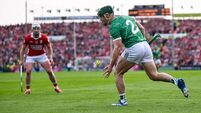Three areas that hold key to cup glory
1 Set-piece shoot-out
Ulster will bid to undermine Leinster’s quest for greatness by limiting the supply of quality possession from the set-piece. It is the one area that potentially offers them a significant edge over their better balanced opponents. Leinster emerged with victory from Bordeaux despite the fact that their scrum — especially in the opening half — and their lineout was poor.
Had Wesley Fofana scored that try at the death and eliminated Leinster then much of the post-mortems would have focused on the failure of the visiting lineout to function under pressure and the manner in which their scrum was disrupted. Clermont’s baffling decision to remove both starting props early in the second half relieved that pressure far more than anything Leinster produced themselves. The return of John Afoa at tighthead is a massive boost for Ulster and he along with Rory Best and Tom Court will go after Leinster in the scrum.
One of the most impressive aspects of Ulster’s performance in their quarter-final win over Munster in Thomond Park was the efficiency of their lineout. Not only did they win clean possession but Munster were unable to put any pressure on their jumpers in the air such was the precision and movement of their men in the air and on the ground.
Leinster’s lineout completely misfired against Clermont and for that reason alone Kevin McLaughlin had to be reintroduced from the start on this occasion as he not only provides an additional target for Richardt Strauss but he is also capable of disrupting the opposition throw. Strauss has consistently received the nod over Ireland’s reserve hooker Sean Cronin due to the accuracy of his throwing but he has taken a step backwards in that department of late. I expect to see Ulster’s chief tactician up front, Johann Muller, seek to put as much pressure in the air on Strauss and company on the Leinster throw from the off in an effort to upset their rhythm.
2 Brutal physicality
Nathan Hines is no shrinking violet. So when a man who has soldiered in the brutal coalface of French rugby with both Perpignan and Clermont Auvergne proclaims of the pain he felt after two pool games against Ulster this season, you begin to sit up and take notice. What Ulster lack in creative terms behind the scrum they make up for with intense physicality at the breakdown and in the contact area. Munster were renowned for a similar approach for years but had the tables turned on them in the quarter-final by Ulster. Ulster’s task in that game was facilitated by the fact the Munster ball carrier was often cut off and isolated from support. Leinster are sharper in this respect and once their player is tackled the next Leinster player, be he a back or forward, adopts the open side flanker role and is in competing for possession immediately. All three of Ulster’s back rows are intensely physical, with Stephen Ferris leading the charge. He has only managed two games in two months but will again feature today. Pedrie Wannenburg, in his last game in Ulster colours, will be primed for another explosive performance but arguably the most crucial member of the triumvirate, Chris Henry, returns having missed the semi-final due to injury. He was sublime against Munster and his crucial job today will be to slow the delivery of Leinster ball while his battle with Sean O’Brien will be one of the key match-ups.
Ulster commit so many bodies to the contact area it is very difficult to recycle possession quickly. There is a price to pay for that, however. If Leinster can match Ulster’s physicality, with Leo Cullen, Brad Thorn, Kevin McLaughlin and O’Brien crucial to that, and produce quick ball, there will be space for the champions to exploit. There is no better side in Europe capable of converting line breaks into points on the board. Joe Schmidt has developed so many clever interplays that they are very difficult to defend against. Ulster will have to be smart in how they deploy their troops and how they play. If they over-commit to the breakdown they may be caught for numbers in defence and if they overplay the territorial kicking and execute badly then Isa Nacewa and Rob Kearney have the counter-attacking skills to punish them.
3 The X factor
When it comes to delivering on the big stage Leinster have the X factor, that intangible quality where someone on a given day produces something magical to steer his team over the line. Jonny Sexton produced it in last year’s final with an incredible 28-point contribution. If Ulster entertain ambitions of upsetting the odds today then they had better find it quickly. To date — with the notable exception of that superb individual effort by Craig Gilroy in Thomond Park — they have progressed through the knockout stages without playing too much rugby. The difference today, however, is that this Leinster defence will not cough up a try quite as easily as Munster did last month. Leinster simply don’t make those kind of defensive errors and therefore Ulster will have to find a level of creativity that was absent against Edinburgh in the semi-final. To their credit, they have scored more tries in the RaboDirect than any other side this season but their methodology tends to be more physical and direct than creative. Not for the first time, Leinster showed against Clermont Auvergne that they have the ability to absorb pressure.
The key for them is patience, a total confidence in each other to make the right decisions under pressure and a commitment to putting in the big tackle. That makes them extremely difficult to beat.



